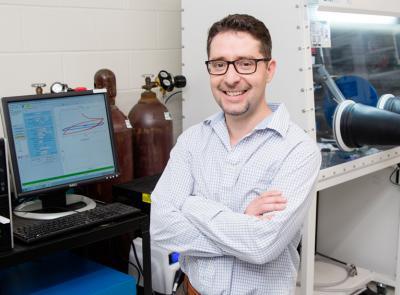
Credit: L. Brian Stauffer
Redox flow batteries are an emerging technology for electrochemical energy storage that could help enhance the use of power produced by renewable energy resources. These power resources are inherently irregular in their supply, which doesn’t typically align with demand on the power grid. In principle, redox flow batteries can be designed to have an energy-storage capacity that is independent of its power rating. However, in practice, the ease with which redox-active molecules are transported to electrode surfaces plays an important role in determining their efficiency, the power that is produced or charged and, in some instances, their length of life.
In a new paper, Assistant Professor Kyle Smith addressed these challenges with a new theory to predict how fluid flow affects the ability of molecules in a flow battery to react at the surfaces of porous electrodes. “Modeling the Transient Effects of Pore-Scale Convection and Redox Reactions in the Pseudo-Steady Limit” was published in a focus issue of the Journal of the Electrochemical Society in honor of Illinois’ Richard C. Alkire, the Charles J. and Dorothy G. Prizer Chair Emeritus in the Department of Chemical and Biomolecular Engineering, former Vice Chancellor for Research, and former Dean of the Graduate College. Alkire is known world-wide for his expertise in metal deposition and multi-scale simulations from atomic-to-processing scales.
Smith and his PhD student theorized in the research that the rates of reaction at microscopic scales were relevant to the underlying microscopic structure of the electrode material. The results of his model enabled him to predict how molecular transport occurs under so-called transient conditions, where the concentrations of redox-active molecules in the battery’s electrolyte change with time.
“We showed that these conditions are particularly relevant to the operation of redox flow batteries, which experience dynamic charge and discharge processes in which electrolyte composition changes with time. This was in contrast to earlier work that had considered such effects primarily from a steady state context where composition is constant in time,” said Smith. “The theory we introduced enables the prediction of mass transfer coefficients based on the microscopic pore structure within electrodes that electrolytes are charged and discharged within. Having such capabilities enables us to engineer how such structures should be designed–in other words, how to engineer them.”
Smith’s finding impacts numerous engineering applications where pore-scale transport is important, including water purification and desalination, catalytic purification of industrial and vehicle exhaust, and transport of reactive minerals and biodegradation of living cells.
This work relates well to Alkire’s career research in improving design in engineering through multi-scale simulations. “The overarching goal of this special volume is to address the need for new engineering methods, driven by remarkable discoveries at the scale of molecules, as well as rapid growth in massive data archives. The focus is on developing new design methods for linking behavior at the molecular scale with traditional electrochemical engineering design procedures at the macroscopic scale. The purpose is to embed quality control at the molecular scale into well-engineered products and processes,” said Alkire of the focus issue published in his honor.
###
The paper by Smith and first author, doctoral candidate Md Abdul Hamid, is the only one in the issue published by an Illinois researcher.
Media Contact
Kyle Smith
[email protected]
217-300-0928
Original Source
https:/
Related Journal Article
http://dx.




